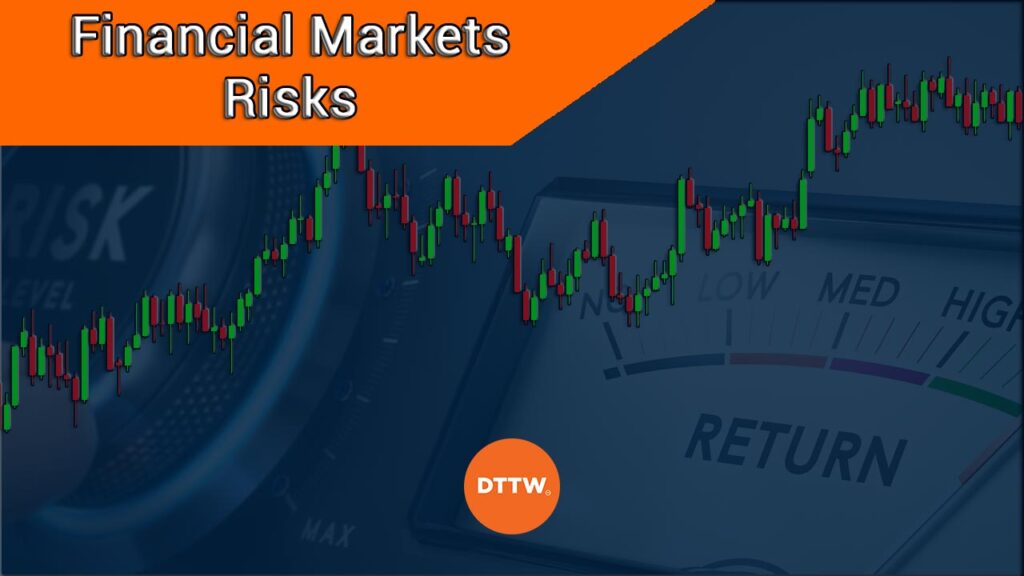Many times in the realm of investing, you may hear the phrase “risk,” but it’s not usually defined. A lot of people use the phrases risk and volatility interchangeably, although the two concepts really have quite distinct connotations. While certain hazards are particular to one firm, others are applicable to whole industries, sectors, or even entire economies.
There are two kinds of risks: systemic and non-systemic. Systemic risk is one that affects a whole industry, sector, or economy whether it occurs inside a single firm or set of organizations. A good illustration of this is the 2007-2008 financial crisis, in which a small number of huge organizations jeopardized the whole financial system.
If a single person or firm suffers a non-systemic or non-diversifiable loss, the term “non-systemic risk” might be used. Legal procedures, for example, might cause a corporation to lose a significant amount of money. A bad court verdict might put a lot of pressure on the company’s stock, therefore it’s possible that the shares could fall.
A single firm is more likely to be affected by this risk, rather than an entire industry. So, to limit non-systemic risk, it’s recommended to diversify a portfolio.
Pay attention to volatility
The rate of change in an asset’s price is referred to as volatility. If an asset’s volatility is high, it is equally likely to rise or fall in value, which means it has a greater influence on a portfolio’s overall worth.
Volatility is common in the Forex market, the world’s biggest financial market. As a result, many investors use the Forex no loss strategy, as volatility is often connected with losing money, and the aforementioned technique allows them to avoid losing money in the majority of circumstances.
Volatility is something that some investors like, while others strive to avoid at all costs. Regardless of how volatile an asset is, it is more susceptible to losses in a down market than a less volatile one.
With other derivatives, such as options and futures contracts, the clearinghouse will guarantee that the requirements of any contract are met even if a party to the agreement has financial difficulties.
It is possible for a bond, a trading transaction, or any other financial instrument where one party relies on another to meet its financial commitments to be compromised.
Risks Associated With Forex Trading
In the foreign exchange market, or forex market, currencies may be exchanged for one another. When it comes to trading currencies, forex traders have an edge over stock dealers, who must choose among hundreds of firms and sectors.
Investors may be forced to pay more margins if the price of the stock drops by a fraction of a percent. Overly aggressive usage of debt during volatile market circumstances is a recipe for disaster.
Interest rates
Investing in a country’s assets becomes more attractive as interest rates rise, supposedly because a stronger currency delivers better returns. If, on the other hand, interest rates drop, the country’s currency would strengthen as investors begin to pull their money out of it.
Due to the complex structure of the interest rate and how it affects currency values, forex prices may move drastically.
Lag
When there is a lag between when a contract is signed and when it is settled, there are transaction risks connected with fluctuating currency rates. Trading in the foreign currency market takes place around the clock, which means that exchange rates might fluctuate before a deal has even been completed.
Different currency values might be exchanged at various periods throughout the trading day.
Risks Of Stock Trading
The stock market isn’t for you if you’re looking for a risk-free way to invest. Despite the inherent dangers of investing in the stock market, it is an essential part of any sound financial strategy. You just need to be aware of the most significant risks associated with investing and take steps to ensure your safety.
These four dangers aren’t the only ones you’ll have to worry about while putting up an investing strategy, but they are significant ones to keep in mind.
Investors who buy individual stocks face the most risk from company-specific risk. If a company’s revenues or earnings fall short of your expectations, you may suffer financial losses as a result of your ownership.
It’s possible for a company’s market value to plummet due to poor operational results. In other situations, a company’s sales and profit numbers may be impressive, but its growth or future may not be strong enough to fulfill excessively optimistic investor expectations.
Companies may go under the most severe conditions, culminating in the loss of all of their invested money. Investors in Enron can vouch for this.
By completing your study, you can lower your company’s risk. Analyze quarterly earnings figures, listen to management comments on those numbers, and use various financial measures to gauge success. Inquire about what others are saying about your company and industry. Check to see if a stock’s price-to-earnings ratio is reasonable in light of its expected profits.
Unfortunately, no amount of studying can make you a psychic.
How to mitigate risks in stock trading
The only way to properly minimize company-specific risk is via diversification. Think about diversifying your portfolio by purchasing additional companies in the same sector, or even in other industries, if things don’t go according to plan.
The greater the number of stocks you hold, the lower the risk for anyone. For this, mutual funds and ETFs are excellent options.
A company’s stock is always exposed to market risk and volatility, no matter how well it does in its business. Supply and demand have a role in stock pricing, just as in any other market.
